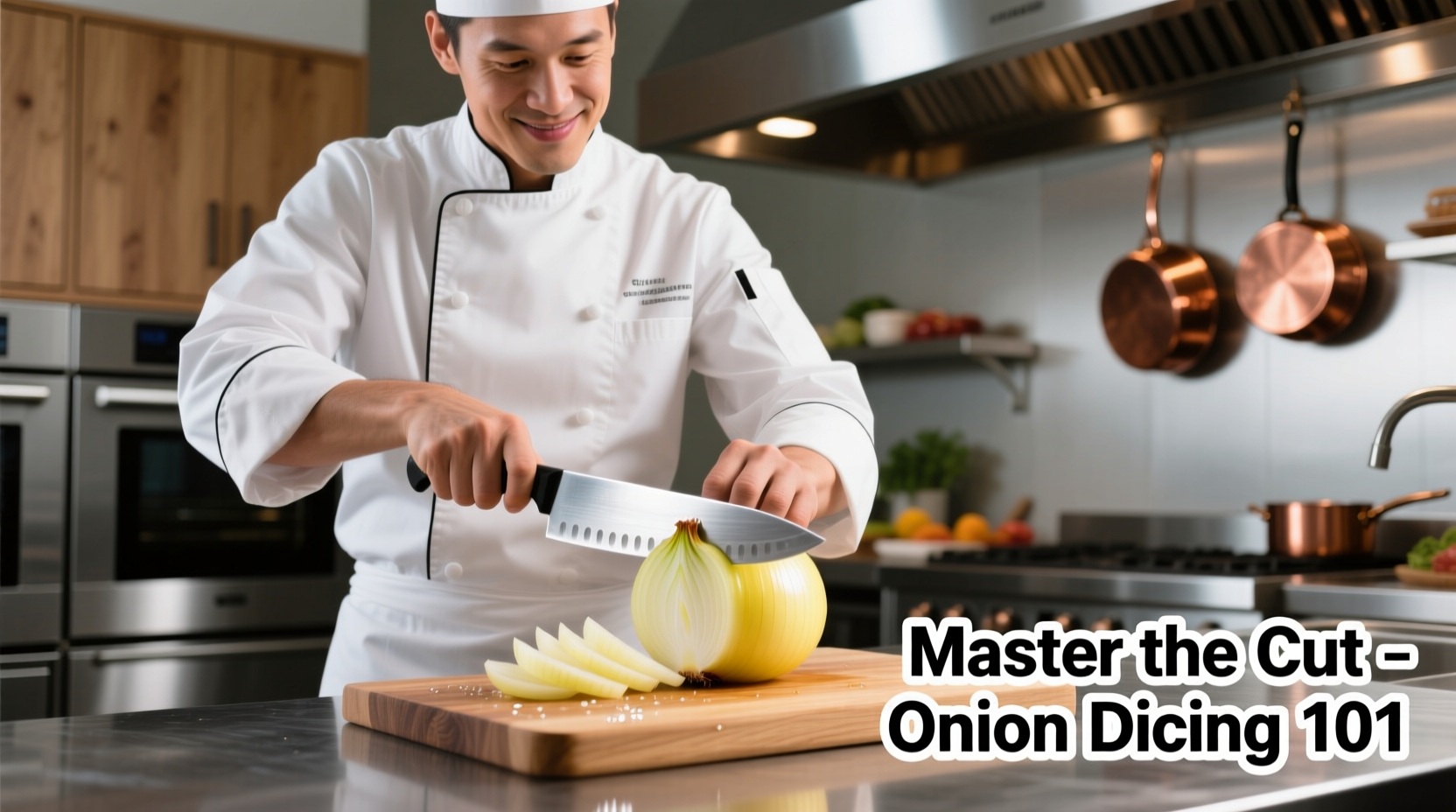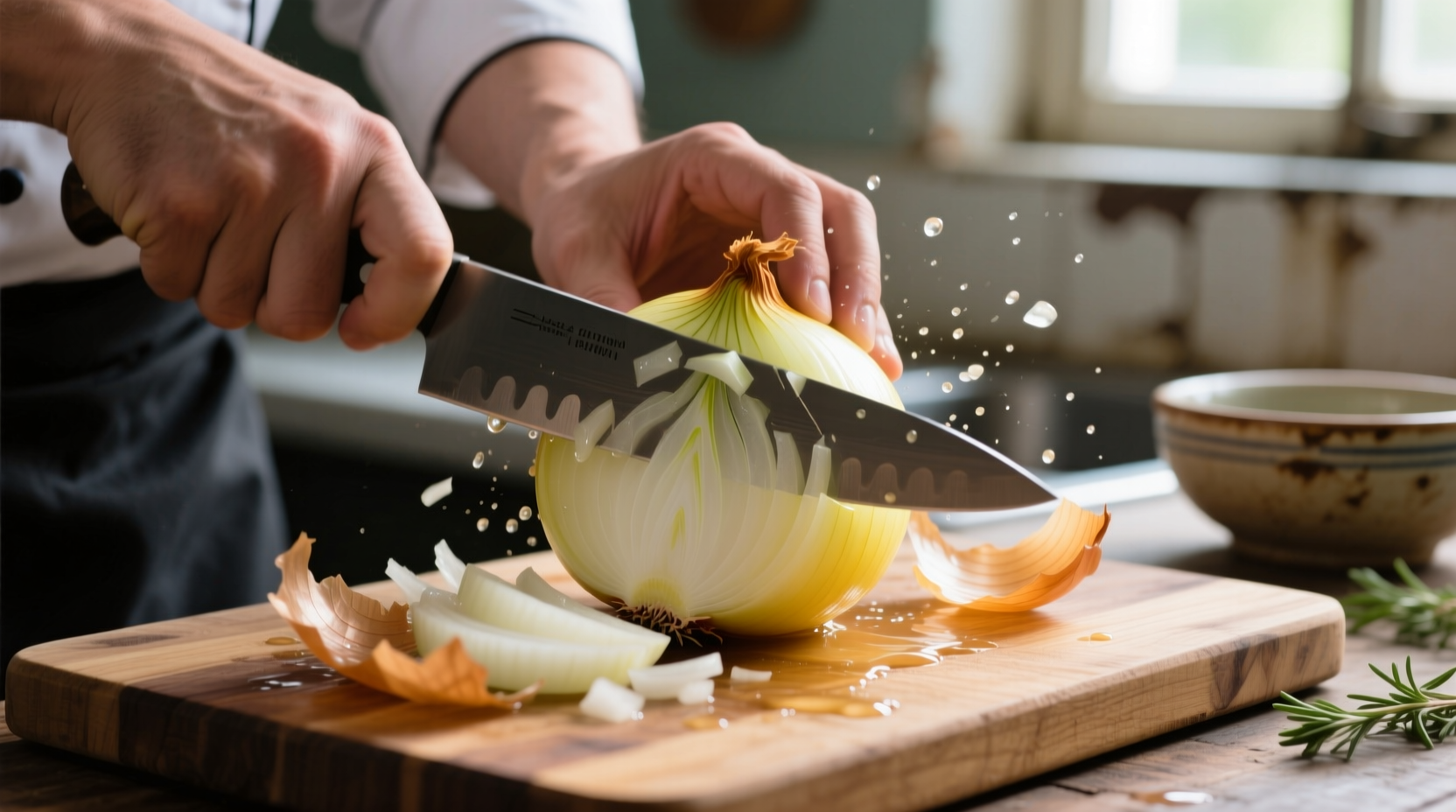Dicing onions properly transforms your cooking results. The right technique creates uniform pieces that cook evenly, release optimal flavor, and prevent those frustrating kitchen tears. Follow these professional methods to achieve restaurant-quality results at home.
Essential Tools for Perfect Onion Dicing
Before you begin, gather these kitchen essentials:
- Sharp chef's knife (8-10 inches)
- Stable cutting board (wood or plastic)
- Bowl of ice water (optional for tear reduction)
- Damp kitchen towel (for grip)
| Tool | Professional Recommendation | Why It Matters |
|---|---|---|
| Knife Type | 8-inch chef's knife | Provides optimal balance between control and efficiency for medium-sized onions |
| Cutting Surface | Wooden board | Preserves knife edge better than glass or stone surfaces |
| Knife Sharpness | Regularly honed | Sharp blades crush cells less, reducing tear-inducing compounds |
Step-by-Step Onion Dicing Technique
Preparation Phase
- Peel the onion and cut off both ends
- Stand the onion on its root end (this keeps sulfur compounds contained)
- Make a vertical cut through the center, keeping root intact
Horizontal Slicing
Lay each half flat-side down. Make horizontal cuts from the top toward the root, spacing them ¼ inch apart. Don't cut through the root - this keeps the onion together for safer vertical slicing.
Vertical Slicing
With the onion still intact at the root, make vertical slices from the top down at ¼ inch intervals. The spacing determines your dice size - smaller intervals create fine dice for salsas, wider for stews.
Final Dice
Hold the onion with your non-dominant hand in the "claw grip" (fingertips curled under). Slice perpendicularly across the vertical cuts to create perfect cubes. Release the root end last.

Science-Backed Tear Reduction Methods
Onion tears occur when enzymes release syn-propanethial-S-oxide gas. The American Chemical Society confirms these evidence-based solutions:
- Cold therapy: Chill onions for 30 minutes before cutting (slows enzyme reaction)
- Sharp knives: Reduce cell damage by 40% compared to dull blades (Journal of Food Science)
- Ventilation: Work near running water or fan to disperse gas particles
- Eye protection: Swim goggles create an effective barrier against vapors
Common Mistakes and Solutions
Even experienced cooks make these errors. Here's how to fix them:
Uneven Dice Sizes
Problem: Pieces cook at different rates
Solution: Maintain consistent spacing (use your knife width as visual guide) and keep cuts parallel to original axis
Excessive Tearing
Problem: Cutting through root end first releases maximum gas
Solution: Always preserve root structure until final dice step - this contains 70% of tear-inducing compounds
Safety Concerns
The USDA Food Safety and Inspection Service recommends these knife safety practices:
- Always cut away from your body
- Use claw grip to protect fingertips
- Secure cutting board with damp towel underneath
- Never try to catch a falling knife
When to Use Different Dice Sizes
Professional chefs match dice size to cooking method for optimal results:
- Large dice (¾ inch): Stews and braises where texture matters
- Medium dice (½ inch): Sautéing for even cooking in 5-7 minutes
- Small dice (¼ inch): Mirepoix bases and quick-cooking dishes
- Finely minced: Salsas and raw applications where texture should disappear
Advanced Techniques for Perfect Results
Take your onion dicing to the next level with these chef-approved methods:
- The French chef method: After vertical cuts, rotate onion 90 degrees before final slicing for perfectly symmetrical cubes
- Batch processing: Dice multiple onions at once using the "stack and slice" technique (place sliced layers on top of each other)
- Flavor preservation: Sprinkle diced onions with vinegar immediately to lock in sharpness for salads
Storage Tips for Diced Onions
Proper storage maintains freshness and prevents odor transfer:
- Store in airtight container with paper towel to absorb moisture
- Refrigerate for up to 5 days (USDA recommends 7 days maximum)
- Freeze in oil for cooking applications (lasts 6 months)
- Never store at room temperature for more than 2 hours











 浙公网安备
33010002000092号
浙公网安备
33010002000092号 浙B2-20120091-4
浙B2-20120091-4